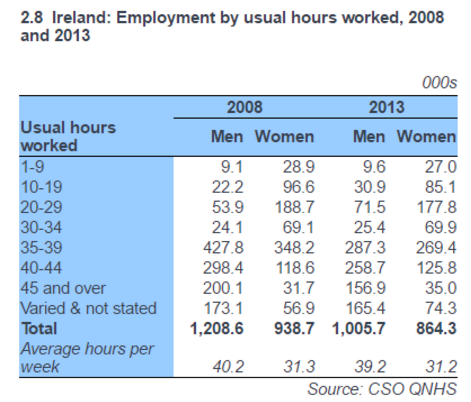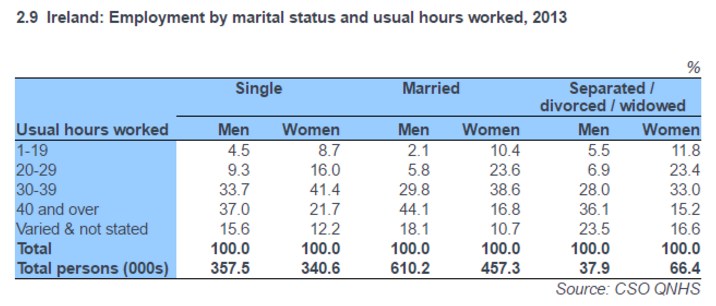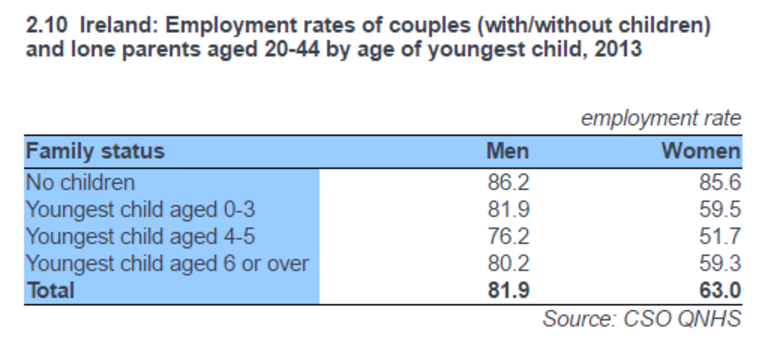By Seán
The idea that a wage gap exists in the sense that a man and woman go into the same job and the woman earns 86% of what a man earns is simply incorrect. These sorts of studies fail to take into account hours worked and career choices, which seems to happen time and time again in these sorts of studies. This essay will be orientated around Ireland.
So, hours worked: Its simple, really. Men work longer hours according to the Central Statistics Office (CSO.) “Men worked an average of 39.2 hours a week in paid employment in 2013 compared to 31.2 hours for women and married men worked longer hours than married women, with close to half of married men (44.1%) working for 40 hours a week or more compared to just 16.8% of married women”


This would account for why the average wage for men is larger than women. It comes down to hours worked.

A factor bigger than Trump’s wall is simply career and life choices. Men work longer hours as the report from the CSO shows. This indicates that women, when they have children, compared to men when married, tend to spend more time with children and at home. With no children, men and women have an almost identical employment rate with a margin of only 0.6% between men and women.
When women have children there is an immediate drop off of 26.1%, so when women have children, they spend full time caring for them compared to the less than 5% of men. Another factor is career choice. Men pick jobs that have higher risk and are in greater demand, such as stem, according to The Irish times
“By 2013 that proportion had fallen to 40 per cent. In the same year there were just 436 female entrants into computer science at university level out of a total of 2,613, or 16 per cent.
Engineering, manufacturing and construction courses fare no better, with male entrants outnumbering females by four to one in 2013. Out of almost 118,000 people working in Stem in Ireland, just a quarter are women.
The phenomenon is not just an Irish one. Less than 7 per cent of tech positions in Europe are filled by women. In the US the number of female entrants to computer science is still going down.”
According to the CSO the vast majority (85%) of graduates in engineering, manufacturing and construction in 2012 were male while over three-quarters of graduates in the education, health and welfare sectors were female. As we know there is a huge demand for STEM jobs and as demand increases price increases. This means that STEM jobs have a higher average wage and combined with the life choices and hours worked.
This explains why, as in the U.S. and the UK, Ireland has an earnings gap, not a wage gap.
IMHO The story does not die because women like hearing it. The feminist in them does not like men being paid more than her, but the wife likes hearing her husband earns more than the woman next door. The wife also knows that although motherhood reduced her income she still gets to spend her husbands money.
I disagree , I think people believe it because of the continuous push of the narrative by feminist
Really? Have you seen the comments made by women here? https://www.youtube.com/watch?v=G6u10YPk_34&lc=z13xtlg5bunaz1i0223xd5dy1kqzxrlbu04.1486254970573241
A lot of non feminists believe there is a wage gap/ hiring gap/ promotions gap based on sexism even if they are doing better than their male counterparts. With Dave Cullen’s recent video women are now blaming household work that’s causing them to “miss out”
all the perks without earning it https://www.youtube.com/watch?v=R5jL6Kk2OEk
The idea of blaming housework is right out of the feminist narrative, along with insinuating that women should be paid more at work because of things they do at home in their off time for themselves and their families.
It does take underlying selfishness to be gullible toward such a stupid narrative… but it’s still a feminist narrative driving that chatter.
I believed that. Why? Because I was told by multiple sources and had no reason to doubt them. I was wrong. People make mistakes. But non-feminists is everyone, so you’re blaming the propagation of feminist rethoric on everyone, yourself included.
What about this bulllshit? A lot of these women are being pathetic pieces of shits pushing the wage gap and shouting down those that give facts and figures proving them false. Here’s another fucking commercial https://www.youtube.com/watch?v=5xJI4zYR5o8
The owner of Bianco is Tony Bianco. As far as I can tell, Tony is not a female name.
I’ll just get back to this: marketing is made up of women.
Hired by a man, if you can’t separate women from feminists you should try going outside sometime…
All the while that it is women who have the babies, I would think there has to be something very wrong in any society where men failed to out-earn women.